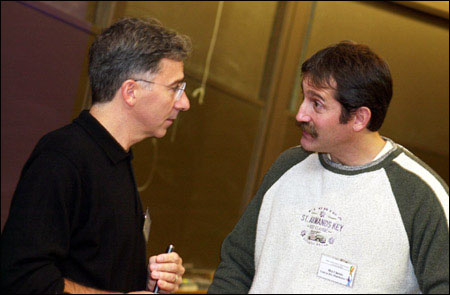‘Century of the cell’ is here:
Melton touts stem cell research to area high school teachers

The controversy over cloning and stem cell research has maintained a steady boil over the past few years, with politicians, religious leaders, editorial writers, and ethicists vying to stir the pot of public opinion.
So heated are the reactions provoked by these topics that it is easy to lose sight of the scientific issues driving the research. A talk last Wednesday (Oct. 9), by biologist Douglas Melton, the Thomas Dudley Cabot Professor of the Natural Sciences, helped to clarify the reasons scientists are so excited about these areas.
Melton’s audience was comprised of 70 science teachers and curriculum directors from 56 high schools in Massachusetts, New Hampshire, and Rhode Island. Following the lectures, the educators spent an hour touring Melton’s labs and asking questions about his research. The discussion of scientific and related issues continued over a group dinner.
The activities were the first in the High School Outreach Fall 2002 Lecture Series, offered by the Department of Molecular and Cellular Biology (MCB) and supported by the Howard Hughes Medical Institute (HHMI). The five-lecture series, focusing on aspects of developmental biology, will continue every other Wednesday through Dec. 4. The series, which is provided free of charge to this group of educators, is designed to help high school teachers bring insights from cutting-edge research into the classroom.
Melton began his talk with a prediction. The 20th century, he said, was the century of the gene and DNA. This line of research began in 1900 with the rediscovery of Gregor Mendel’s studies of inheritance and culminated with the mapping of the human genome at the end of the century.
“The challenge now is how to make sense of the genetic code, how to decipher it,” said Melton. “This is why the 21st century will be the century of the cell, because the unit of life is not the gene but the cell. I want to make the case that stem cell biology is the most interesting thing you can do right now.”
The greatest challenge facing biologists today, Melton said, is solving the mystery of differential gene expression. How is it that while each cell in the body contains an identical set of genes, embryonic development somehow produces many different types of cells, arranged according to a specific structural pattern?
Biologists used to believe that certain genes were turned off as the organism developed, but recent cloning experiments with frogs and tadpoles suggest that the cell “reads” certain genes at different times, the way a person in a library decides to read a particular book. The cloning of more advanced animals like the sheep Dolly, have been undertaken to shed further light on this basic question, Melton said.
Related questions concerning cell differentiation are driving the current interest in stem cells. Stem cells are undifferentiated cells and are responsible for cell renewal. When they divide, one daughter cell becomes a specialized cell and the other becomes another stem cell.
Scientists have many questions about this process, including: What allows stem cells to divide without differentiating? What factors control stem cell differentiation? Is there a universal stem cell? What factors guide the cells to the repair site?
Multigenetic diseases like diabetes, osteoporosis, Alzheimer’s, and Parkinson’s might be cured if scientists were able to solve the riddle of stem cells, Melton said.
“If one could harness the power of stem cells, one could treat these diseases. This would be likely to have an impact on more than 128 million people.”
According to Robert Lue, senior lecturer on Molecular and Cellular Biology and director of HHMI Undergraduate and Outreach Programs at Harvard, MCB has conducted outreach programs for local teachers since the early 1990s, but this year’s program has hit a new high in participation.
“We’ve been really thrilled by the response,” he said. “We got almost 100 applications, and this made us realize there was a tremendous need and a tremendous interest.”
As a result of this enthusiasm, the size of the program – originally limited to 30 teachers – was increased to its present size.
In addition to lectures and lab work, the teachers are also returning to their classes with armfuls of teaching materials in the form of case studies, CD-ROMS, lab protocols, and other items. In addition to the intellectual stimulation the program provided, the availability of tangible take-aways was particularly welcome.
“Many of them were stunned by the amount of material we gave them. They told me that they felt their batteries had been recharged and that they couldn’t wait to get back for the second session,” Lue said.
In addition to the fall program, MCB is sponsoring a 15-session program in the spring in which high school teachers will come to Harvard with their students for lab work focusing on a variety of topics. A third program scheduled for summer 2003 will be similar to the fall program, except that the five lectures and lab sessions will take place in an intensive, week-long format.




